Last updated on 13th August 2025 by Sarah Sarsby

“Take care of yourself” is something we’ve all heard before. It sounds easy, right? But if your schedule is already jumbled, fitting in an hour-long bubble bath or a three-hour spa day seems about as possible as going to Mars. In reality, taking care of yourself doesn’t need to be hard, expensive, or take a lot of time. In fact, the best self-care habits are the ones that you don’t have to force yourself to do and don’t feel bad about missing.
We’ll show you how to make a self-care routine that fits your busy life in this piece. There are simple steps that will make taking care of yourself feel like second nature, like figuring out what you really need and making habits that you can actually keep up.
Disclaimer: This is a paid content placement
1. Understand what self-care really means
Self-care often gets a bad reputation as being “self-indulgent” or “just pampering.” While treating yourself can be part of it, true self-care is much deeper. It’s about taking deliberate actions that help you stay physically healthy, mentally balanced, and emotionally resilient.
Think of it like charging your phone: you don’t wait until it’s completely dead to plug it in. You give it small boosts throughout the day so it stays functional. The same goes for you – small, consistent acts of care keep your energy and mood steady.
Some examples of self-care include:
- Getting enough sleep
- Eating nourishing meals
- Moving your body regularly
- Setting boundaries to protect your time
- Spending time on hobbies that bring joy
When you see self-care as maintenance rather than a luxury, it becomes easier to prioritise.
Another important reason to care for yourself is your educational performance. Students often push themselves to the limit, sacrificing rest and mental health to meet deadlines. This constant pressure can lead to burnout, which ultimately makes studying harder. If you ever feel overwhelmed and simply can’t keep up, there’s no shame in seeking professional help – some choose to pay for research paper service to reduce stress and free up time. This isn’t about avoiding responsibility, but about protecting your well-being so you can stay focused, healthy, and motivated in the long run.
2. Identify your personal needs and limits
Here’s the thing: not all self-care tips work for everyone. Some people feel refreshed after a 6am jog, while others would rather hit the snooze button three times. That’s why your first step is figuring out what you actually need.
Ask yourself:
- What drains me most? (Work stress? Lack of sleep? Social obligations?)
- What recharges me fastest? (Quiet time? Exercise? Talking to friends?)
- What do I realistically have time for?
You can also track your days for a week to spot patterns. Maybe you notice you always feel sluggish mid-afternoon – a 10-minute walk might help more than another coffee. Or you might realise your evenings are chaotic, so a short morning routine could work better.
This self-awareness stops you from cramming in trendy routines that don’t suit you, and instead helps you focus on what’s actually helpful.
3. Start small and build gradually
One of the biggest mistakes people make with self-care is trying to overhaul their whole lifestyle overnight. That’s like trying to run a marathon without training – it’s exhausting, and you’ll probably quit halfway.
Instead, start small. Choose one or two easy actions you can do consistently. Once those feel natural, add another.
For example:
- Week 1: Drink an extra glass of water each morning.
- Week 2: Add a 5-minute stretch before bed.
- Week 3: Spend 10 minutes journaling after lunch.
This gradual approach builds momentum. Your brain gets used to the idea that self-care is a normal part of your day, not an optional bonus. And here’s a secret: the more success you experience, the more motivated you’ll be to keep going.

4. Fit self-care into your existing schedule
If you’re already busy, you don’t need to find more time for self-care – you need to weave it into what you’re already doing. This way, you avoid adding extra stress to your day.
4.1. Pair it with current habits
One powerful trick is “habit stacking” – linking a new action to something you already do. For example:
- Meditate for 2 minutes after brushing your teeth.
- Do calf raises while brushing your hair.
- Listen to a motivational podcast during your commute.
Because the cue (your existing habit) is already in place, the new action becomes easier to remember.
4.2. Use your natural energy peaks
It’s not always easy to get things done at the same time. You should plan your self-care around your “energy peaks,” which are times when you usually feel alert. If your best time is in the morning, you might be able to fit in a quick workout then. If you stay up late, relaxation activities like reading or taking care of your skin may work better in the evening.
Self-care that fits with your natural pace keeps you from going against your body clock.
5. Make it easy, accessible, and non-negotiable
Even the best plan won’t work if it’s too complicated. If self-care feels like a chore, you’ll skip it. The trick? Remove friction.
- Keep a yoga mat in your living room so you can stretch anytime.
- Store healthy snacks at eye level in the fridge.
- Set phone reminders for your bedtime.
Another thing is to treat self-care like any other important meeting. You wouldn’t just show up and not go to a work meeting, so don’t cancel on yourself. If something important comes up, move the meeting, but don’t cancel it totally.
Over time, this shows yourself and others that you care about your health.
6. Handle setbacks without guilt
It’s true that you will miss days. Things go wrong in life: kids get sick, tasks pile up, and strange things happen. It’s alright. Skipping self-care once in a while won’t undo your gains.
Change your thought to “I paused” instead of “I failed.” After that, just pick up where you left off.
A habit that can be changed is one that can last. Self-care that is reasonable and long-term is one that leaves room for mistakes. Remember that the goal isn’t to always do the same thing; it’s to make taking care of yourself a normal part of your life.
Conclusion
It’s not necessary to follow someone else’s perfect morning routine or try to fit unrealistic rituals into your own plan in order to build a self-care routine that works for you. You should pay attention to your own wants, begin small, and make it easy for yourself to show up.
You can make a routine that helps you even on your busiest days by adding simple, important acts of care into your daily life instead of forcing them. It’s like planting seeds: little things you do over and over that help you become stronger and more durable.
You’ll know the secret next time someone says, “Make time for self-care.” It’s not going to be about getting the time. It’s about fitting it into the time you already have.

